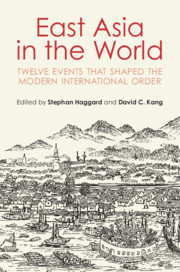Book contents
- East Asia in the World
- East Asia in the World
- Copyright page
- Contents
- Figures and Tables
- Contributors
- Acknowledgments
- Part I Historicizing East Asian International Relations
- 1 Introduction
- 2 East Asian International Relations over the Longue Duree
- 3 The Political Economy of the East Asian Maritime World in the Sixteenth Century
- Part II The East Asian System over Time
- Part III Contact: East and West
- Conclusion
- Bibliography
- Index
3 - The Political Economy of the East Asian Maritime World in the Sixteenth Century
from Part I - Historicizing East Asian International Relations
Published online by Cambridge University Press: 08 October 2020
- East Asia in the World
- East Asia in the World
- Copyright page
- Contents
- Figures and Tables
- Contributors
- Acknowledgments
- Part I Historicizing East Asian International Relations
- 1 Introduction
- 2 East Asian International Relations over the Longue Duree
- 3 The Political Economy of the East Asian Maritime World in the Sixteenth Century
- Part II The East Asian System over Time
- Part III Contact: East and West
- Conclusion
- Bibliography
- Index
Summary
After the Ming dynasty prohibited private overseas trade in 1374, China’s once-flourishing maritime commerce languished until the 1520s, when a boom in Japanese silver mining impelled Chinese mariners to flock to Japan for the monetary metal in high demand in China. Dubbed “Japanese pirates” (Wokou) by the Ming government, these Chinese entrepreneurs developed multinational merchant coalitions and trade networks (including Japanese and Portuguese traders) across the East/Southeast Asian maritime world. The Wokou also became crucial allies of the daimyo of western Japan, embroiled in civil wars and eager to obtain both trade revenue and Portuguese gunpowder weapons. Ming military campaigns in 1548–1557 eliminated many Wokou leaders, but the smuggling trade proved intractable and the Ming lifted its maritime ban in 1567. The Wokou era also witnessed – albeit temporarily – the emergence of the “port polity” as an alternative to the Chinese imperial model of political economy within East Asia.
- Type
- Chapter
- Information
- East Asia in the WorldTwelve Events That Shaped the Modern International Order, pp. 44 - 64Publisher: Cambridge University PressPrint publication year: 2020
- 1
- Cited by

